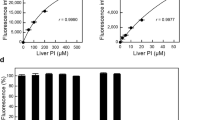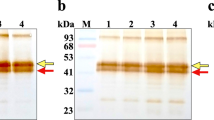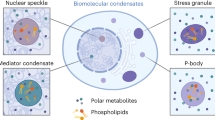Abstract
THE blood plasma of rabbits contains about 80 mgm. phosphatides. What is the average time a phosphatide molecule spends in the plasma?
This is a preview of subscription content, access via your institution
Access options
Subscribe to this journal
Receive 51 print issues and online access
$199.00 per year
only $3.90 per issue
Buy this article
- Purchase on Springer Link
- Instant access to full article PDF
Prices may be subject to local taxes which are calculated during checkout
Similar content being viewed by others
References
Artom et al., Archiv. internat. de Physiol., 45, 32 (1937); 47, 245 (1938); Hahn and Hevesy, Skandin. Archiv. Physiol., 77, 148 (1937); Kgl. Dansk. Vid. Selsk. Medd., 2, 14 (1933). Hevesy and Aten, Kgl. Banek. Vid. Selsk. Medd., 14, 5 (1939). Chalkolf et al., J. Biol. Chem., 122, 169 (1937); 128, 493 (1939). Dols et al., NATURE, 77, 141 (1933).
Author information
Authors and Affiliations
Rights and permissions
About this article
Cite this article
HAHN, L., HEVESY, G. Phosphatide Exchange between Plasma and Organs. Nature 144, 204–205 (1939). https://doi.org/10.1038/144204a0
Issue Date:
DOI: https://doi.org/10.1038/144204a0
This article is cited by
-
Der Stoffwechsel menschlicher Erythrozyten
Blut Zeitschrift für die Gesamte Blutforschung (1965)
-
Der Einflu� von Cholinphospholipiden auf das Spektrum der freien Plasmaaminos�uren bei toxischen Lebersch�den
Klinische Wochenschrift (1963)
-
Untersuchungen �ber den �bergang markierter Phosphate in das Nervensystem, eine spezielle Anwendung der Indikatormethode
Die Naturwissenschaften (1946)
Comments
By submitting a comment you agree to abide by our Terms and Community Guidelines. If you find something abusive or that does not comply with our terms or guidelines please flag it as inappropriate.



